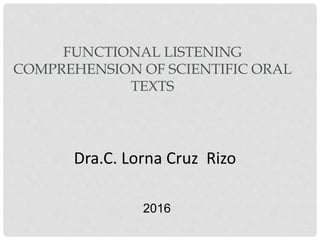
Listening
- 1. FUNCTIONAL LISTENING COMPREHENSION OF SCIENTIFIC ORAL TEXTS Dra.C. Lorna Cruz Rizo 2016
- 2. Here´s a tricky question: What do you hear right now? Hear Listen
- 4. Why is listening important? Allows receptiveness at communication. Provides an oral input for further production. Improves pronunciation, intonation and rhythm. ?
- 5. Listening is an active process When a proficient listener listens, he doesn't passively receive what the speaker says. Distinguishes fact from opinion
- 6. Affective or emotional dimensions to listening Task
- 7. Listening for general information: international events https://www.youtube.com/watch?v=xjphZ8IJvbc Imagine you are invited to participate at the U.S. Science, Technology and Innovation (STI) Cooperation forum, that takes place at Johns Hopkins, School of Advanced International Studies. Following the presenter initial words, you would have: - Started discussing the topic. - Taken your seat. - Thanked him for joining you this morning. Then, you would have noticed that the event is about: - International diplomatic relations. - Science diplomacy. - International scientific affairs. Thus, participants will be discussing about a main question that is: - How do you promote scientific cooperation through diplomacy? - What does scientific cooperation promote? - How is diplomacy cooperating internationally? This question will be answered by means of: - Ways in which it is done. - Ways in which it is difficult. - How can Europeans and Americans work together in the challenges. - When can it be implemented. Being given the main topics of the discussion, you decided to participate in: (you may select more than one) - Science within diplomacy: internationally valuable scientific proposals. - Science in diplomacy: the idea of how foreign policy can be improved through scientific advice and a better understanding of science. - Diplomacy for science: how can we improve scientific cooperation through diplomatic cooperation. - Science for diplomacy: how to use scientific cooperation to improve international relations ties that we have with other countries. Is there a big difference between the main topics suggested or a close relation? What is your opinion on the topic?
- 8. Intensive listening: talks on scientific research experiences From the scientific talk given by Jack Andraka available at: https://www.youtube.com/watch?v=g-ycQufrgK4 Take notes on the most important information and essential details of the talk. Be able to share them with the class. Task
- 9. Listening for specific information: tutorial From the tutorial: How I read most research papers, at: https://www.youtube.com/watch?v=eSEP2T-xz8g - Comment on the general procedure the speaker follows. - Is there any difference between the procedure described by the speaker and the one you learned in the reading class? If it is so, why do you think there are differences? - Do you agree with the speaker´s procedure? - Do you have any other idea on how to read a scientific paper? Task
- 10. Independent listening task Search the web for an authentic listening material related to your research. Present any resource (notes, graphic organizer…) in no more than 60 words, containing some main points from the audio. You should also provide the link for the track. Task
